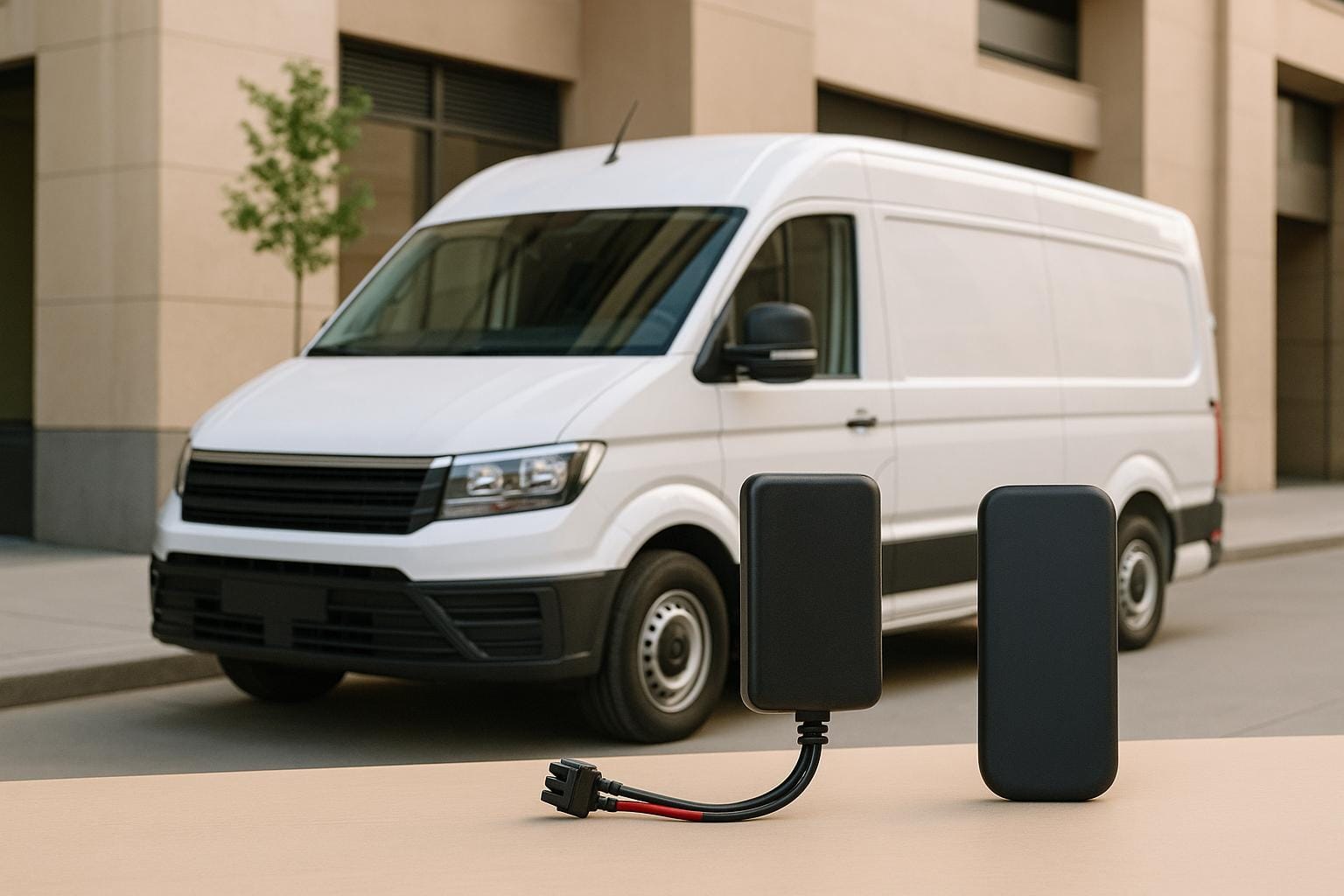Looking for the best van tracker for your fleet? Here's a quick breakdown to help you choose between wired and Bluetooth trackers:
-
Wired Trackers:
- Powered by the vehicle's battery for continuous operation.
- Offers enhanced security and real-time tracking.
- Requires professional installation (£40–£100 upfront).
- Ideal for urban fleets and high-security needs.
-
Bluetooth Trackers:
- Portable, with easy plug-and-play setup.
- Battery-powered, requiring regular replacements.
- Best for small or seasonal fleets with flexible needs.
- Lower upfront costs but limited tracking range.
Quick Comparison
| Feature | Wired Trackers | Bluetooth Trackers |
|---|---|---|
| Power Source | Vehicle battery | Replaceable batteries |
| Installation | Professional fitting (£40–£100) | Self-installation |
| Tracking Range | Wide (via cellular networks) | Limited to Bluetooth range |
| Anti-Tampering | Advanced protection features | Basic tamper alerts |
| Cost | £8.95/month + installation fees | £6.95/month + battery costs |
Key takeaway: Choose wired trackers for reliability and security in larger fleets, or go for Bluetooth trackers for flexibility and lower costs in smaller operations.
Wired Van Trackers: Core Functions
Main Components and Functions
Wired trackers are directly connected to a vehicle's power source, ignition, and ground, ensuring they remain operational at all times. These systems come equipped with accelerometers for added security and efficiency.
| Component | Function | Benefit |
|---|---|---|
| Power Connection | Direct link to the vehicle battery | Continuous operation without the need for recharging |
| Accelerometer | Detects motion and impacts | Improves security and monitors driver behaviour |
| GPS Module | Tracks location | Provides precise positioning |
This combination of features creates a reliable foundation for effective fleet management.
Fleet Management Results
Thanks to their seamless integration with vehicle systems, wired trackers deliver tangible benefits for fleet managers in the UK. These devices can lead to savings of £1,000–£2,000 per vehicle each year.
Key advantages include:
- Instant alerts for unauthorised vehicle movement
- Automated scheduling for MOTs and servicing
- Digital record-keeping to meet regulatory standards
- Fuel usage analysis to identify cost-saving opportunities
For example, John O'Conner Grounds and Maintenance adopted wired tracking in March 2023, seeing notable improvements in both operational efficiency and cost control.
Setup Requirements
To maximise the benefits of wired trackers, proper installation is essential. This involves professional setup to ensure accurate integration with vehicle systems.
- Installation costs: £40–£100 per vehicle
- Monthly service fee: £8.95 per vehicle
- Low maintenance: Designed to resist tampering and reduce upkeep
Certified technicians are required to handle the installation, ensuring components are correctly positioned and wired. This approach minimises risks such as signal interference or faulty connections, which could compromise tracking performance.
Bluetooth Van Trackers: Core Functions
Main Components and Functions
Bluetooth van trackers rely on Bluetooth Low Energy (BLE) technology to provide efficient, wireless tracking. They can also act as gateways, connecting multiple devices seamlessly.
| Component | Function | Key Benefit |
|---|---|---|
| BLE Module | Enables short-range communication | Energy-efficient tracking |
| Battery Pack | Serves as an independent power source | Easy and flexible installation |
| Gateway System | Facilitates asset communication | Supports multi-device connectivity |
| Mobile Integration | Authenticates drivers | Simplifies verification |
Fleet Management Results
Bluetooth trackers bring practical advantages, thanks to their adaptability and straightforward setup. For example, a fuel distribution company successfully used Bluetooth beacons to pair trailers with the correct trucks. This streamlined their operations and improved distribution management.
Some standout benefits include:
- Tracking assets beyond just vehicles
- Driver authentication via smartphone integration
- Quick and easy installation
- Budget-friendly implementation
Setup Requirements
To get the best performance, it's crucial to consider the technical and operational aspects of these trackers. Their range varies depending on the model and environmental conditions:
| Tracker Type | Maximum Range |
|---|---|
| Standard BLE Device | 60 metres |
| Tile Pro | 152 metres |
| Tile Mate | 107 metres |
| Tile Slim | 107 metres |
However, environmental factors, like obstructions and interference, can affect performance. To maintain efficiency:
- Regularly check and replace batteries
- Test signal strength periodically
- Optimise the placement of trackers
- Monitor for potential interference
While these trackers require occasional battery replacements, they offer flexible deployment and comprehensive asset tracking capabilities.
Next, we’ll take a closer look at how Bluetooth trackers stack up against wired van tracker options.
Direct Comparison: Wired vs Bluetooth
Specs and Costs Table
Here’s a quick look at the key differences between wired and Bluetooth trackers to help you decide:
| Feature | Wired Trackers | Bluetooth Trackers |
|---|---|---|
| Initial Cost | £35–£99 (device cost) | £6.95/month (subscription) |
| Installation | Requires professional installation | Self-installation |
| Power Source | Connected to the vehicle's battery | Replaceable batteries |
| Range | Wide range via cellular networks | Limited to Bluetooth connectivity |
| Anti-tampering | Advanced protection features | Basic protection features |
| Real-time Tracking | Continuous updates | Intermittent updates |
| Additional Features | Includes accelerometer, maintenance alerts | Focused on asset tracking |
| Annual Operating Cost* | £8.95/vehicle/month | £6.95/vehicle/month plus battery replacement costs |
*Based on current market prices for standard packages.
These distinctions become even clearer when applied to real-world scenarios in the UK.
UK Fleet Examples
Take a closer look at how UK businesses are using these trackers:
-
Urban Delivery Fleet – London
A courier service in London with 50 vehicles reported saving £1,500 per vehicle annually. They achieved a return on investment in just 90 days, thanks to improved route planning and efficiency in the city’s dense traffic. -
Rural Operations – Yorkshire
An agricultural supply company in Yorkshire chose Bluetooth trackers for their mixed fleet. The wireless installation worked well with their seasonal operations, though they needed to stay on top of regular battery changes.
These examples show how different contexts can make one type of tracker more suitable than the other.
Selection Criteria
Here’s a breakdown of which tracker works best for specific needs:
| Criterion | Best Tracker | Why? |
|---|---|---|
| Urban Operations | Wired | Provides stronger security and continuous tracking. |
| Rural/Temporary Fleet | Bluetooth | Easier to install and better for flexible, short-term use. |
| Large Fleet (50+ vehicles) | Wired | Lower maintenance costs over time. |
| Small Fleet (<10 vehicles) | Bluetooth | Lower upfront costs make it more accessible. |
| High-Security Needs | Wired | Offers better anti-tampering features. |
Ultimately, the right choice depends on your fleet’s size, operating environment, security requirements, and budget. Matching the tracker type to your specific needs will ensure you get the best value and performance.
Conclusion: Making Your Choice
Main Points Review
When deciding on the right tracking solution, it comes down to your fleet's specific needs. Wired trackers are ideal for situations where consistent, secure monitoring is critical. They stand out for their reliability and ability to provide detailed tracking, which can lead to annual savings of £1,000–£2,000 per vehicle. Their continuous power source and strong security features make them a great fit for urban operations or larger fleets requiring constant oversight.
On the other hand, Bluetooth trackers are perfect for businesses looking for flexibility and lower initial costs. These trackers are particularly useful for:
- Seasonal operations
- Fleets with fewer than 10 vehicles
- Businesses that frequently change vehicles
- Operations with limited budgets at the outset
These points offer a solid foundation to help you make a well-informed decision.
Getting Started
Now that you understand the key differences, here’s how to move forward and choose the best solution for your fleet. Use the performance and cost comparisons above to guide your decision based on your operational needs.
-
Assess Fleet Requirements
Consider your fleet's size, the environment it operates in, and its security demands. For urban fleets, wired trackers are often the better choice. For rural or more dynamic operations, Bluetooth trackers might be the way to go. -
Analyse Costs
Look at both the upfront and long-term expenses. Match your budget to the benefits you expect to gain over time. -
Test Before Full Deployment
Start with a pilot programme to evaluate how well the chosen solution works for your specific needs.
The key is finding a balance between the initial investment and the long-term advantages. While wired systems may require a larger upfront cost, their reliability and advanced features often make them worth it, especially for businesses prioritising security and comprehensive monitoring.
Top 4 BEST GPS Trackers (2025) | Features & Installation | SafeTag Trackers
FAQs
What should I consider when choosing between wired and Bluetooth van trackers for my fleet?
When deciding between wired and Bluetooth van trackers, it's essential to consider factors like installation, security, and overall functionality.
Wired trackers offer a high level of security since they are discreetly installed and connected directly to the vehicle's power supply. This ensures they operate consistently without interruptions. That said, they typically require professional installation and might not be the best option if you frequently switch vehicles.
In contrast, Bluetooth trackers are portable and easy to set up, making them a great choice for temporary or flexible use. However, they usually need regular charging and may lack advanced features such as anti-theft alerts.
The right choice ultimately depends on your fleet's specific needs, striking the right balance between security, convenience, and budget.
How do the ongoing costs of wired and Bluetooth van trackers compare, and how could this affect a business's budget?
The long-term expenses of wired and Bluetooth van trackers depend on factors like installation, maintenance, and operational demands. Wired trackers often come with higher upfront installation costs, as they usually need professional fitting. That said, they tend to be more durable and dependable, which can help reduce maintenance costs in the long run. Bluetooth trackers, by contrast, are simpler to install and cheaper initially, but they might require more frequent battery replacements or upgrades, potentially increasing ongoing expenses.
When planning your budget, consider the size of your fleet and how often the trackers will be in use. For larger fleets or vehicles that are constantly on the road, the reliability of wired trackers might provide better value over time. Meanwhile, for smaller fleets or businesses focused on flexibility and lower initial costs, Bluetooth trackers could be a better fit. Choosing the right option based on your operational needs and financial priorities is crucial to getting the most out of your investment.
Are Bluetooth trackers reliable enough for fleet security and accurate tracking in urban areas?
Bluetooth trackers are a practical option for fleets navigating urban areas, offering a compact, easy-to-install, and budget-friendly solution. They work well for smaller fleets or businesses that value straightforward setups and minimal costs.
That said, Bluetooth trackers do have their drawbacks. Their range can be limited, and signal interference is more likely in crowded cities with tall buildings or significant electronic activity. For fleets that need real-time updates or wider coverage, wired trackers might be a better fit, as they tend to deliver more dependable and precise tracking.
When deciding between these options, think about the routes your vehicles typically take and the level of tracking detail your operations require.

